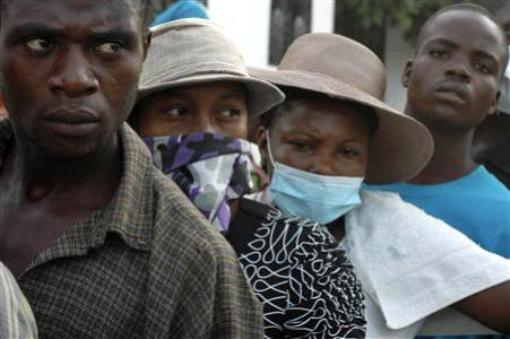October 24, 2010 (KATAKAMI / Reuters) - A cholera epidemic in Haiti has killed more than 250 people, the government said on Sunday, but it added the outbreak which has sickened more than 3,000 may be stabilizing with fewer deaths and new cases reported over the last 24 hours.
"We have registered a diminishing in numbers of deaths and of hospitalized people in the most critical areas ... The tendency is that it is stabilizing, without being able to say that we have reached a peak," Gabriel Thimote, director-general of Haiti's Health Department, told a news conference.
The accumulated deaths since the cholera outbreak began around a week ago in the earthquake-ravaged Caribbean nation stood at 253, while total cases were 3,015, mostly in central rural regions straddling the Artibonite river.
Thimote said that whereas previously the hospital in Saint-Marc in the Artibonite region was recording deaths by dozens, it had registered only one on Saturday.
The epidemic is the second emergency to strike the poorest country in the Western Hemisphere this year. A catastrophic January 12 quake killed up to 300,000 people in Haiti, which is only a two-hour flight from the United States.
Scientific papers published by seismology experts in the journal Nature Geoscience on Sunday said the January earthquake may have been caused by an unseen fault and pressure could be building for another quake.
Despite the reports of a stabilizing trend in the cholera outbreak, foreign aid agencies were preparing for a possible worst-case scenario of the epidemic spreading across the country, including the densely populated capital.
U.N. peacekeepers were erecting cholera treatment centers -- structures large enough to treat 150 cases each -- in the main outbreak region of Artibonite, in the overcrowded capital Port-au-Prince and in the Center province.
The detection of five "imported" cases in Port-au-Prince, involving patients who had traveled south to the city from the central outbreak zone, has raised fears of the virulent diarrheal disease spreading in the capital.
Experts see Port-au-Prince's sprawling, squalid slums and tent and tarpaulin camps housing some 1.3 million homeless quake survivors as vulnerable to the cholera, which is transmitted through contaminated water and food.
"We are planning for the worst-case scenario here ... we have to be ready for this," United Nations humanitarian spokeswoman in Haiti Imogen Wall told Reuters. The 12,000-strong U.N. peacekeeping mission in Haiti (MINUSTAH) is helping to put up the cholera treatment centers.
The Pan American Health Organization, the regional office of the World Health Organization, said cholera cases had been confirmed in Haiti's Artibonite and Center provinces and in the Oest province, where the capital is located.
Suspected cases have also been detected in Nord and Sud provinces.
